
Health as a human right is our entry point.
Health care and social protection for Cambodians has improved during the last decade; but challenges still lie ahead in accessing quality health services. Top on the list of areas to improve include maternal and newborn mortality as well as infectious and non-communicable diseases, which remain a daunting reality for many people.
The Cambodian-German Social Health Protection Programme supports the Royal Government of Cambodia to improve the quality of and access to health services mainly for vulnerable people and those living in poverty, using a multi-level approach of policy advice and practical implementation. Our efforts closely align with the Ministry of Health’s Strategic Plan and strengthen the capacity of national and sub-national institutions to protect the health of women, men, young people, children and the elderly.
Social health protection programmes enable people to access health care when needed without the risk of impoverishment or other financial burden. With our contributions, we lay the foundations for a comprehensive social health protection system linked to systematic quality improvement in health care. We assist with the design of national strategies, clinical guidelines and tools to promote sexual and reproductive health, patients’ rights and clients’ satisfaction and apply a mainstreaming approach to ensure responsive services to women and people from disadvantaged groups, such as the elderly and people with disabilities.
Germany further supports the Fast Track Initiative of the Cambodian Government to improve maternal and newborn health. Vouchers improve access to family planning and pre-and post-natal health services, and promote reproductive health at the community level.
Nurses, midwives and doctors are capacitated to provide quality services in our target areas. Our joint efforts address critical gaps in emergency obstetric care, family planning and sexual and reproductive health, which are vital areas for improving women’s rights.
For more information about health and social protection please visit the Healthy DEvelopments Portal of the German Federal Ministry for Economic Cooperation and Development (BMZ).
GIZ Regional Fit for School Programme Ready for Expansion
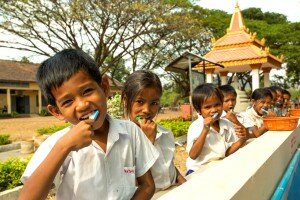
Daily group toothbrushing activity by students of Svay Kal Primary School in Kompong Thom Province.
4 June 2014
Kompong Chhnang, Kompot, Kompong Thom, Phnom Penh and Takeo Provinces, Cambodia – Diseases related to lack of hygiene, such as diarrhea and respiratory infections, are still the leading cause of death for children living in Cambodia. By the time children enter school, more than half are diagnosed with intestinal worms and vast majorities have dental caries, virtually all untreated. Compared to healthy pupils, students suffering from pain and disease are frequently absent from school, sleep less, and demonstrate an overall lower academic performance: Health status and school performance are closely related.
GIZ’s Regional Fit for School Programme in Cambodia aims to prevent infectious diseases among public primary school students with the aim to improve school attendance through three simple and low-cost interventions: 1) daily hand washing with soap; 2) daily tooth brushing with fluoride toothpaste; and 3) bi-annual deworming.
8,000 students in Cambodia benefit from hygiene programme, 100,000 to follow
The programme has been supporting the School Health Department of the Ministry of Education Youth and Sport (MoEYS) of Cambodia implement its schemes since December 2011. Since programme inception in Cambodia, nearly 8,000 students have benefitted from improved hygiene in ten public primary schools in Phnom Penh and other four provinces: Kompot; Takeo; Kompong Thom; and Kompong Chhnang. This regional programme is also being implemented in three other countries: Lao PDR, Indonesia and the Philippines. The programme aims to further support the MoEYS to scale up the program in collaboration with other partners to benefit 103,000 more primary students in Cambodia by 2015.
Regional programme partners include SEAMEO INNOTECH, a regional center of the South-East Asian Ministers of Education Organization.
Partners collaborate to improve programme expansion support
After two years of programme implementation, the Regional Fit for School Programme in Cambodia is now supporting the Ministry of Education, Youth and Sport prepare for programme expansion in collaboration with partner organisations active in water, sanitation and hygiene projects (WASH) in schools, namely UNICEF Cambodia, ESC-BORDA and World Vision Cambodia. The programme expansion is led by the School Health Department of the MoEYS, and is supported financially by partner organisations that include daily group hand washing in schools in their respective WASH programmes. GIZ provides technical assistance on integrating daily hygiene activities in these programmes and instruction on how to support schools to construct necessary group washing facilities.
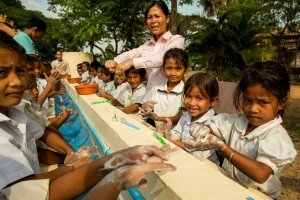
Daily group hand washing activity by students and teachers of Svay Kal Primary School in Kompong Thom Province.
The geographical areas covered by the expansion include: additional schools in the five existing Regional Fit for School provinces, plus schools in Siem Reap and Preah Vihear provinces. To prepare for the expansion, the Regional Fit for School Programme team has been working very closely with the School Health Department and partners, and has been preparing and finalising programme tools necessary for building the capacity of educational officers at sub-national level. This capacity development will prepare the officers for the implementation of daily hygiene practice at the schools. The tools, which can also be used by the schools and communities to reinforce their participation in the programme, include the Fit for School School-Community Manual and video, and a group washing facilities catalogue. All materials were developed jointly with the MoEYS.
Parallel to this expansion, the Regional Fit for School Programme is introducing a new group hand washing facility design, which includes low-cost and easy-to-install features, while saving water. The design is able to accommodate 22 children at a time, has been tested successfully, and installed in approximately 100 locations in the Philippines. Currently, a prototype of the facility is being produced in Cambodia and following a successful test run, the program will work with partners to introduce the design and installation in the expansion schools. For more information on the design facility visit the Facebook group on Hardware for Group Hand Washing in Schools: https://www.facebook.com/groups/632408213516487/
With promising prospect, the Regional Fit for School Programme is committed to continuing collaboration with key stakeholders to ensure that the expansion is a success. Along the way, the programme will fulfill GIZ’s commitment to the health and well-being of Cambodian children and national development.
For more information on GIZ’s Regional Fit for School Programme, please contact:
Ayphalla Te Country Project Manager
Email: [email protected]
Mobile phone: +855 12 906 908
Breaking down Barriers: An inclusion programme in Cambodia
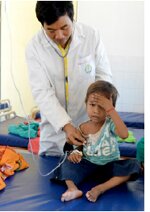 10 June 2014
10 June 2014
Cambodia has one of the highest rates of disability in the world. GIZ is working with the Cambodian government and local NGOs to promote inclusion of persons with disabilities in the health service. That includes a screening and referral system for rural children at risk of long-term impairments.
Moreover, part of GIZ’s work in Cambodia is promoting the voice of the disabled to overcome stigma and help them get access to health care.
For more information:
http://health.bmz.de/topics/Social-protection/studies_and_articles/Breaking_down_Barriers/index.html
Early detection of disabilities helps children to reach their full potentials
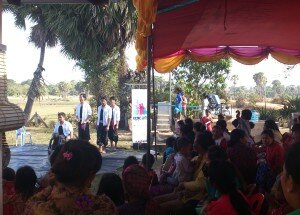 February 2014
February 2014
Kampot and Kampong Thom Province, Cambodia
A mother’s worry, eased.
Uy Kosal, 26 years old, is a mother from ChhorVillage in KampongThomProvince. Her village health support group instructed her to bring her 4 months old daughter, Vat Varny, to Trea Health Centre for a medical check-up on ‘Health Centre Day’.

Uy Kosal now understands how to feed her daughter better and has plans for corrective cleft lip surgery.
On this particular day, eye and ear doctors from Kampong Thom hospital and trained health centre staff provided consultation services to children under ten years old.Health care professionals focused their attention on children with impairments. Kosal was very worried about her daughter, born with cleft lip. Her daughter’s cleft lip makes feeding time difficultand as a result, she is under-weight. Cleft lip is closely linked to some ear diseases and may slow speaking.On Health Centre Day at Trea Health Centre, Kosal received information on how to feed her daughter and when and where she should bring her daughter for further treatment. Kosal was more relaxed after learning that the lips of her daughter can be treated at the age of 5 months with surgery at the Angkor Hospital for Children in Siem Reap. She is now motivated to breast-feed more often to help her daughter gain weight. She plans to take her daughter to Siem Reap province for the cleft lip surgery recommended by her doctor.
Health Centre Days reach 10,000 children and caregivers in Kampong Thom and Kampot Province
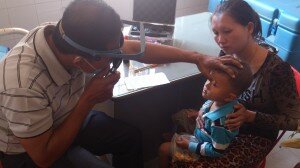 Health Centre Days are special events supported by GIZ and implemented by health centres and hospital doctors in Kampong Thom and Kampot province with support of Handicap International. The aim is to raise awareness on impairments and disabilities and to support early detection and intervention for children. Children that receive support with their disabilities will be more likely to achieve their full potential. Almost 10,000 girls, boys and their caregivers have participated so far. Over 330 children with disabilities were detected and referred to appropriate medical and support services. Services include those available at the NationalPaediatricHospital in Phnom Penh and AngkorHospital for Children in Siem Reap.
Health Centre Days are special events supported by GIZ and implemented by health centres and hospital doctors in Kampong Thom and Kampot province with support of Handicap International. The aim is to raise awareness on impairments and disabilities and to support early detection and intervention for children. Children that receive support with their disabilities will be more likely to achieve their full potential. Almost 10,000 girls, boys and their caregivers have participated so far. Over 330 children with disabilities were detected and referred to appropriate medical and support services. Services include those available at the NationalPaediatricHospital in Phnom Penh and AngkorHospital for Children in Siem Reap.
For more information, please contact [email protected] or [email protected], GIZ Social Health Protection Project, Cambodia.
Towards Inclusive Health Services in Cambodia – A Promising Approach
 03 February 2014
03 February 2014
More than one billion people across the world live with some form of disability, a large majority of whom live in developing countries. Poverty and disability are often interrelated. The United Nations Convention on the Rights of Persons with Disabilities (CRPD) represented a major step towards making disability a human rights issue, and became an important framework for disability-inclusive development cooperation. The CRPD, ratified by Germany in 2009, encouraged and influenced development cooperation partners in their efforts to ensure greater inclusion of persons with disabilities in programmes and policies. Following its ratification, Germany developed a National Action Plan on the Inclusion of Persons with Disabilities and the Federal Ministry for Economic Cooperation and Development (BMZ) elaborated its own Action Plan for the Inclusion of Persons with Disabilities (2013), which aimed to ensure systematic mainstreaming of the inclusion of persons with disabilities in German development policy. It outlined several strategic objectives and measures to be incorporated into development cooperation. One measure is the inclusion of persons with disabilities within the health sector in Cambodia, building on the existing partnership with the Cambodian Government in this area.
Cambodia ratified the Convention in 2012, committing itself to promoting the equality of persons with disabilities in all spheres of society. In 2011, the Royal Government of Cambodia and the German Government agreed during its cooperation meetings to develop ideas about how to mainstream the inclusion of persons with disabilities in current and future cooperation activities to ensure that one of the most vulnerable groups of Cambodian society could increasingly participate in and benefit from poverty reduction programmes and development initiatives. Based on this decision, Germany provided additional resources for the priority area Health (Social Health Protection Programme) of Cambodian-German bilateral development cooperation. They were allocated in June 2012 to the Technical Cooperation (TC) project implemented by the Deutsche Gesellschaft für Internationale Zusammenarbeit (GIZ), operating on behalf of BMZ to enhance the inclusion of persons with or vulnerable to disabilities.
With this article, the authors aim to show how the political commitment to include persons with disabilities and other groups such as older persons has been translated into practice in the Cambodian health sector. Based on the
principles laid out in BMZ Action Plan for the Inclusion of Persons with Disabilities, the authors present key developments and lessons learned from the inclusion of persons with disabilities in the Social Health Protection Project, which is part of the Cambodian-German Social Health Protection Programme. The first section provides a brief overview of disability prevalence and different forms of disability as well as main challenges persons with disabilities face in relation to health care access in Cambodia. In the second section, the authors describe the process of mainstreaming the inclusion of persons with disabilities in the health sector, outlining key elements of this work and factors influencing success.
Please find the full article here: http://www.zbdw.de/projekt01/media/pdf/2013_3_BiE.pdf
Copyright: “Disability and International Development” (Institute for Inclusive Development)
Strengthening social health protection schemes and improving client satisfaction with public health services
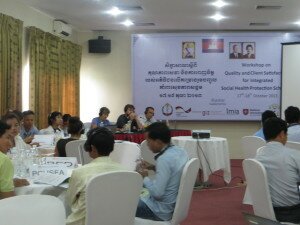
17 January 2014
Background
With the aim of advancing social health protection in Cambodia, operators of social health protection schemes across Cambodia joined forces to establish an association that would allow for a collective voice and provide a platform for collaboration. The initiative would also enable access to quality technical support, attracting financial resources; and promote information sharing and policy development within the sector.
Therefore, a number of organisations joined hands and contributed to the establishment of a new capacity development institute for NGOs active in the social health protection sector e.g. as operators for the Health Equity Funds (HEF), integrated social health protection schemes (extended HEFs through voluntary enrolment programmes), and Micro Health Insurance (MHI). This new institute, the Social Health Protection Association (SHPA), began its operations, with support of GIZ, in May 2012.
SHPA’s mission is to support and promote the quality, sustainability and coverage of voluntary enrolment programmes and other social health protection schemes in Cambodia.
Its main objectives are to support social health protection schemes:
- To provide a collective voice and platform for collaboration;
- To establish a high-quality resource centre for all social health protection schemes; and
- To provide an information and communication platform for all stakeholders.
To fulfill its aims, SHPA developed a work-plan, based on key support needs identified by its members, with additional inputs from the Ministry of Health and other key partners. In line with the plan, SHPA organised various workshops and capacity building trainings.
Client Satisfaction and Quality improvement
The majority of the Cambodian population initiates medical treatment in the private sector. Approximately 30% initiates care in public health facilities. The main reason for this is the perceived low quality of care in the public sector. Many Cambodians prefer private providers because they are seen as friendlier and more responsive to patients’ needs, even if the technical quality of services is inferior to that provided in the public sector.
Improving misperceptions of the quality of public health services, and thus overall client satisfaction, is essential to ensure optimal operations of a social health protection scheme. The Ministry of Health guidelines for SHP schemes require operators to address these issues through specific activities to monitor and respond to clients’ feedback. In response, a client Satisfaction Survey Tools (CSST) was developed by the Quality Assurance Office of the Ministry in 2009 with assistance from GIZ. The intent of the CSST is to provide a standardised survey instrument and data collection methodology for measuring clients’ perspectives on care provided by hospital and health centres.
Social health protection schemes have a strong incentive to improve clients’ perceptions of health services by contracted providers, as enrolment –and service utilization- correlates with the population’s satisfaction with these services. Measuring client satisfaction with feedback on the results to providers to inform quality improvement activities, together with effectively addressing complaints while allowing the communities to voice their opinions, are important tasks of SHP operators. Most SHP schemes conduct satisfaction surveys amongst their members and have mechanisms for dealing with complaints and raising issues with healthcare providers. However, these are not standardized across the schemes.
Workshop on Quality and Client Satisfaction for Integrated Social Health Protection Schemes
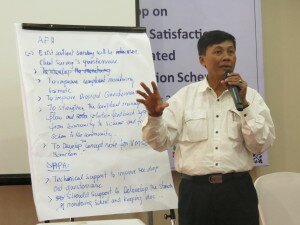
Figure 1 and 2: Participants discussed a wide-range of topics from improving client satisfaction to strengthening external feedback.
Following a situation analysis of existing tools and approaches SHPA’s member organisations requested the Association to support them by:
1) Improving the use of existing quality and client satisfaction tools and processes; and
2) Initiating a process of standardisation to assist operators and the Ministry of Health to monitor perceived quality and client satisfaction within and between schemes
In response to these requests, SHPA conducted a workshop on Quality and Client Satisfaction for Integrated Social Health Protection Schemes on 17-18 October 2013.
During the workshop the operators, SHPA, and representatives from the MoH, and GIZ focused on client satisfaction surveys and tools, complaints mechanisms, data collection, storage and analysis, internal review of data and feedback, and strengthening external feedback to clients, communities, providers and local authorities.
Key issues defined by the operators for further discussion and support included:
- A clear desire by the MoH to standardize tools for measuring client satisfaction;
- Development of a standard database for client satisfaction assessment results;
- Development of standard complaints format and roll-out of an online complaints system together with training to enable staff to effectively handle complaints, to strengthen their interviewing/survey skills and to analyse results of the surveys; and
- Development of standard operating procedures for all associated processes.
Following the results and recommendations from this workshop, SHPA will continue to advocate for the standardisation of tools and approaches, continue the collaboration with the MoH on the development of a data system, and organise a follow-up workshop in 2014 on interview skills and data entry and analysis for field-level staff.
A step towards Universal Health Coverage in Kampong Thom
26 November 2013
The Cambodian Ministry of Health and its partners are taking on the challenge of securing universal access to quality health care. The act aims to do so without risking impoverishment and indebtedness, by covering patients’ direct expenditure related to health through social health protection schemes.
Out-of pocket expenditure for health care an impoverishment risk
Out-of-pocket expenditure constitutes more than two thirds of overall health spending in Cambodia. The health sector’s high reliance on ‘fees for services’ coupled with lacking social health protection puts people at financial, social and economic risk. It can further deter them from seeking health care when in need, as expenses are unpredictable.
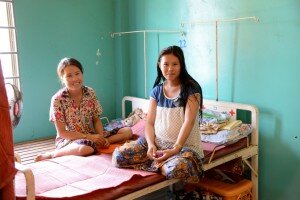
With lower risk of debt, more pregnant women will seek maternal healthcare.
Providing access to Social Health Protection mechanisms for all
In January 2013, the ‘Integrated Social Health Protection Scheme’ was launched in Stoung Operational District in Kampong Thom Province. This innovative approach supported by GIZ’s Social Health Protection Project allows voluntary enrollment in a Social Health Protection Scheme by extending the services of Health Equity Funds. Families can protect their members by joining the scheme and paying an affordable contribution. Through this mechanism, health care users with greater health needs can access public health services whenever needed without risk of impoverishment, of falling into debt and poverty because of unaffordable or unpredictable health care bills. Without discrimination, all pre-identified poor households as well as voluntary enrollees are granted access to the same package of health services. In the scheme’s first months, membership of the scheme has experienced a positive upside trend, increasing to 29% of the population in Kampong Thom.
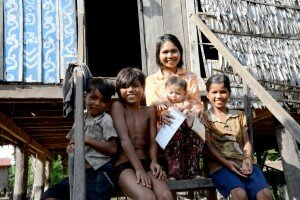
Families identified as ‘poor’ may now be better reimbursed for their health care costs.
The Non-governmental Organisation Action for Health (AFH) operates the scheme. Its tasks as operator include, promotion of voluntary enrolment, awareness raising, collection of contributions, reimbursement the providers for medical service costs. But most importantly, AFH also represents the interests of all scheme-members, poor, which are exempted of contributions, or voluntary. By doing so, AFH plays an important role in securing scheme-members rights and promoting adequate health service provision for the entire population in Kampong Thom.
The schemes’ expansion demonstrates strengthened efforts to make quality health services affordable, accessible and more equitable for all Cambodians. The scheme extends health care to those previously untreated and reduces the risk of slipping into poverty and debt when falling ill and seeking care. The expansion constitutes another step towards Universal Health Coverage.
Cambodia hosts Indonesian delegates to exchange on Regional Fit for School Programme
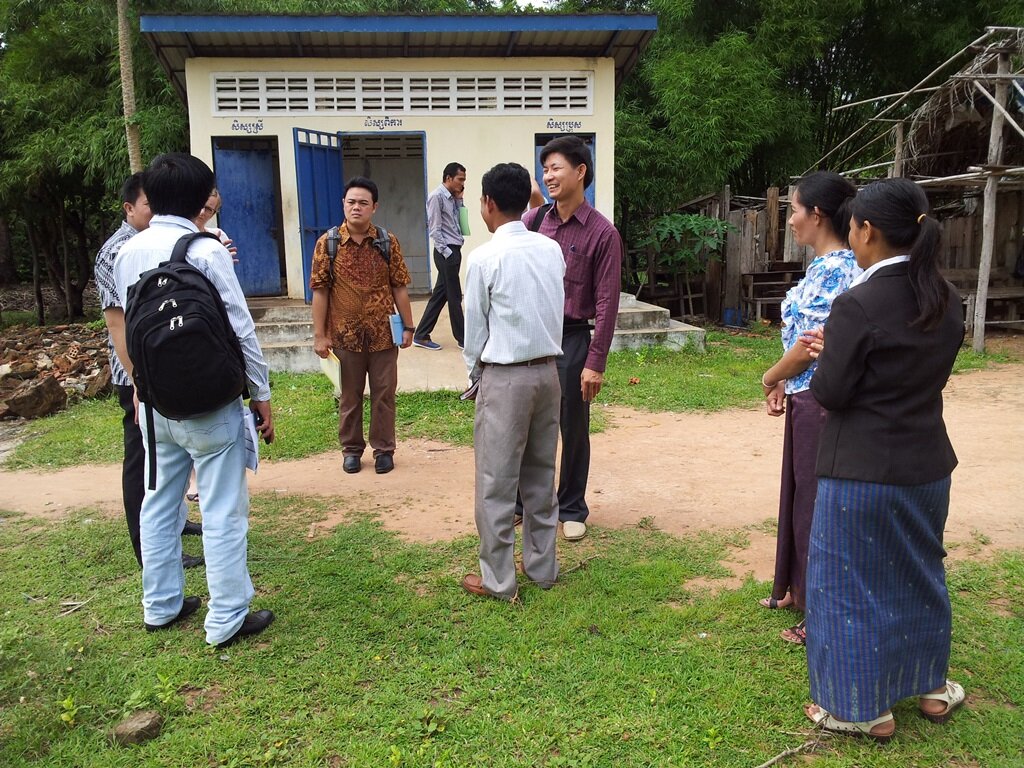
08 August 2013
Kompong Chhnang, Kompot, Kompong Thom, Phnom Penh and Takeo Provinces, Cambodia – Diseases related to lack of hygiene, such as diarrhea and respiratory infections, are still the leading cause of death for children living in Cambodia. By the time children enter school, more than half are diagnosed with intestinal worms and a vast majority has dental caries, virtually all untreated. Students suffering from pain and disease are frequently absent from school, sleep less, and demonstrate an overall lower academic performance, compared to healthy pupils: Health status and school performance are closely related.
GIZ’s Regional Fit for School Programme in Cambodia aims to prevent infectious diseases among public primary school students to improve school attendance through three simple and low-cost interventions: 1) daily hand washing with soap; 2) daily tooth brushing with fluoride toothpaste; and 3) bi-annual deworming.
The programme has been supporting the School Health Department of the Ministry of Education Youth and Sport (MoEYS) of Cambodia with the program implementation since December 2011. Regional programme partners include SEAMEO INNOTECH, a regional center of the South-East Asian Ministers of Education Organization. Since its inception in Cambodia, the programme has benefitted nearly 8,000 students in ten public primary schools in Phnom Penh and other four provinces: Kompot; Takeo; Kompong Thom; and Kompong Chhnang. This regional programme is also being implemented in three other countries: Lao PDR, Indonesia and the Philippines.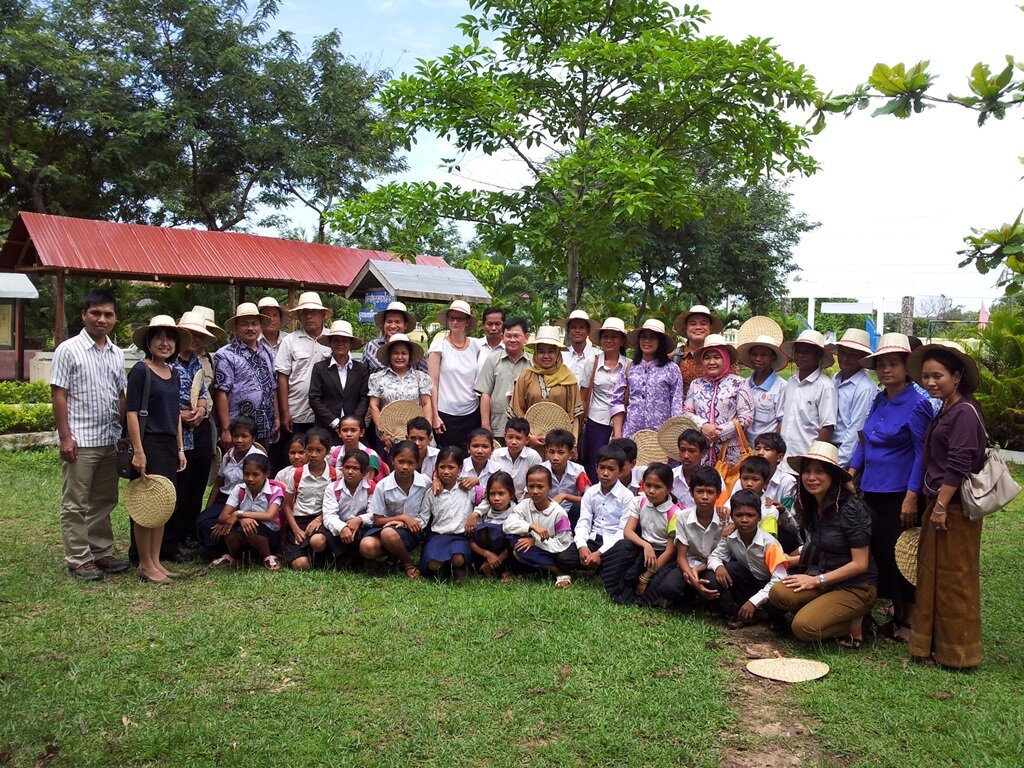
Facilitating regional learning and knowledge exchange
A regional networking meeting was organized in Cambodia from 25-26 June 2013 to allow delegates from Indonesia’s Regional Fit for School Programme the opportunity to observe programme implementation in Cambodia, exchange programme information and experiences with implementation. Six representatives from Indonesia’s Department of Health, Department of Education, and Department of Community Welfare in Bandung and Indramayu, Indonesia represented the delegation. Dr. Ramon Bacani, Director of SEAMEO INNOTECH, and Regional Fit for School Coordination Team and Project Managers in Indonesia and Lao PDR, also joined the visit. The School Health Department of the MoEYS Cambodia hosted the event in coordination with GIZ’s Fit for School Programme’s country team.
Indonesian Delegates receive warm welcome
At MoEYS in Phnom Penh, H.E Nath Bunroeun, Secretary of State, expressed his warm welcome to the Indonesian delegates and noted that the Regional Fit for School Programme applies evidence-based and low-cost interventions to address school health issues in Cambodia. Interventions such as these make the programme suitable for scale-up, countrywide. H.E. congratulated the School Health Department and thanked GIZ and all implementing partners for their support and collaboration efforts to improve the well-being of Cambodia’s children.
During the two-day event, the delegates visited three programme model schools in Takeo and Kompong Thom Provinces to observe the students’ daily hand washing and tooth brushing activities. Additionally, the delegation held meetings with school principals, teachers, commune councils and School Support Committees to discuss success and challenges with implementing the Regional Fit for School Programme.
Indonesian delegation, ‘impressed’ with Cambodia’s progress
Mr. Rigil Munajat, Project Manager of the Fit for School Programme in Indonesia, noted that he was ‘impressed by Cambodia’s commitment to the programme and that model schools in Cambodia implement hand washing and toothbrush activities with their students every school day’, six days a week. The delegates were also impressed by the steps taken by the School Health Department to secure programme sustainability by including a budget for programme materials for the upcoming year submitted to the national government. This action will support the School Health Department with the development of a plan to cover the costs of programme materials from next-year onwards.
For more information on GIZ’s Regional Fit for School Programme contact:
Ayphalla Te Country Project Manager
Email: [email protected]
Mobile phone: +855 12 906 908
Diversity of Health Information Systems in Developing Countries
The need for harmonization in planning and implementation
31 July 2013
Phnom Penh, Cambodia Following on from the webinar “ICT to support Social Health Protection” organized by GIZ Bangladesh and the Joint Learning Network in October 2012, CIM expert Michael Stahl proposes in this article that harmonizing health information systems should be a priority for technical assistance for social health protection.
Many developing countries in Asia, such as Vietnam, Laos, Indonesia and the Philippines, have already introduced social health insurance schemes to different extents, but are now dealing with highly fragmented IT applications among health care implementers. The same issues are found in several African countries.
Other developing countries have yet to implement health insurance programmes, or are in the final planning stages, and their governments would like to avoid making the same mistakes as neighboring countries. Cambodia, Bangladesh and Nepal are good examples of countries, which are beginning technical implementation of social health insurance systems.
In addition, planning and experimentation of these systems are happening in isolation within each country, when viable solutions may already have been developed in other countries. Apart from many practical concerns in achieving health care goals in developing countries, one of the main issues is the use of information technology (IT) in health services, and the lack of harmonized approaches in planning, developing and implementing IT solutions for social health protection implementation.
This paper focuses on the operational side of social health protection implementation in developing countries, explaining how harmonization of social health insurance schemes benefits all stakeholders, and describing how monitoring and evaluation activities can be unsuccessful or lead to wrong results. The relationship between improperly working operational aspects of data management, and the difficulties that arise from this situation, are also examined. Lastly, the reasons for high fragmentation rates among social service implementers are discussed.
Please find the GIZ discussion paper here
German Development Cooperation in partnership with UNICEF provide vital supplies to improve maternal and newborn health in Cambodia
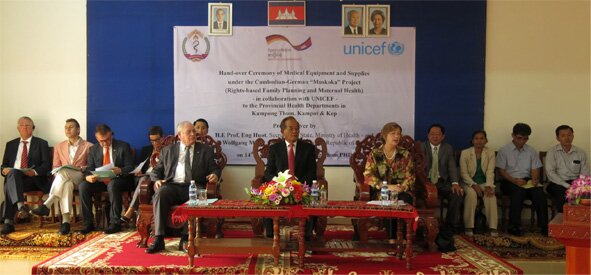
14 August 2013
Kampong Thom, Cambodia Mothers and their newborns in three provinces (Kampong Thom, Kampot and Kep) will benefit from equipment and supplies to improve their health, funded by the German Government as a result of a partnership agreement between the German international cooperation agency, GIZ, and the UN children’s agency, UNICEF.
With the German grant, UNICEF procured equipment valued at more than $ 500,000 including ultrasound scanners, foetal heart detectors, sterilizing apparatus, surgical delivery instruments and resuscitators, to enhance the delivery of quality essential and emergency obstetric and newborn care services to some 300,000 women of reproductive age attending government health centres and hospitals in the three provinces. The supplies also include newborn kits with baby care items to be given to mothers attending government health facilities, with a view to encouraging community demand and utilisation of health services.
While Cambodia has made good progress with reducing maternal and child mortality, three out of four newborn deaths occur in their first week of life, especially during the first day, largely due to complications at birth and lack of postpartum care.
At the handover ceremony for the medical equipment and supplies, the Ambassador of the Federal Republic of Germany, H.E. Dr. Wolfgang Moser, congratulated the Royal Government of Cambodia for the progress so far achieved: “This success persuades the Federal Government of Germany to continue its support to the Ministry of Health in view of responding to the needs of the Cambodian population.”
In her remarks, UNICEF Representative in Cambodia, Rana Flowers said, “UNICEF is pleased to partner with GIZ, to contribute our experience and expertise in procurement, to provide critical, quality, value-for-money supplies from reliable manufacturers, to support the government to deliver and scale-up essential services for mothers and newborns.”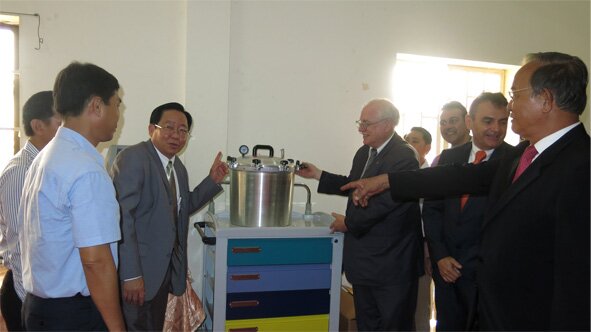
Receiving the equipment, the Secretary of State for Health, Ministry of Health, His Excellency Professor Eng Huot, said, “Limited resources – human and financial – continue to be a major constraint to scale-up essential and life-saving health interventions to reduce maternal mortality. We are therefore, most grateful that the German Government and UNICEF have responded together to work with us to address this issue.
The German Federal Ministry for Economic and Development (BMZ) is funding development cooperation programmes in 50 developing countries worldwide. The cooperation with the Royal Government of Cambodia was resumed in 1994 and is mainly implemented by Deutsche Gesellschaft für Internationale Zusammenarbeit, GIZ, and KfW Entwicklungsbank. Health and Rural Development are the two priority areas of German Development Cooperation in Cambodia, facilitated by a cross-cutting area Good Governance. Technical and financial assistance in the health sector is provided through the “Social Health Protection Programme”, with a focus on health care financing, health service delivery, and health system governance. The Rights-based Family Planning and Maternal Health (Muskoka) project is part of this programme.
Muskoka at Women Deliver 2013
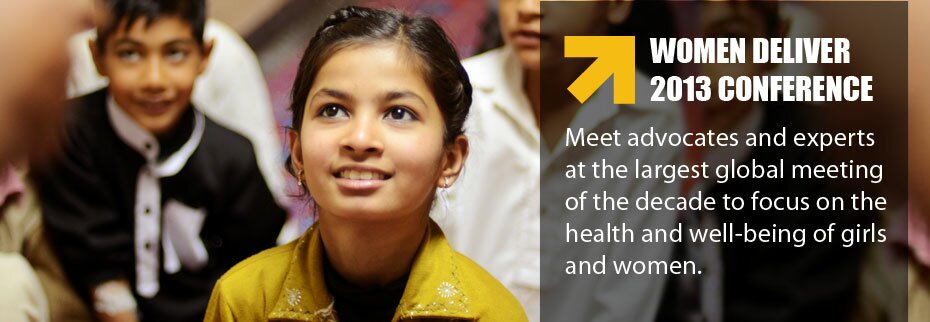
Kuala Lumpur, Malaysia Meghan Olson from the Muskoka Project took part in the Women Deliver conference in Kuala Lumpur from 28 to 30 May 2013. During the three day conference she attended lectures on: the social and economic benefits of investing in women’s reproductive health; comprehensive sexual education; closing the gap in MDG 5; gender and family planning; women’s health; challenges for women in leadership; global progress in family planning; gender based violence and sexual and reproductive health and rights; benefits/challenges of public private partnership; ending violence against women; contraception in the post 2015 agenda; adolescent girls in health and development; population, sustainability, and women’s rights; and male involvement in maternal and newborn health.
This conference provided an invaluable opportunity to learn from the experiences of other professionals and organizations in the field and share first experiences of the GIZ Muskoka project. Meetings took place between colleagues from GIZ HQ and MEDICONSULT (Muskoka Consultant Ms. Pinging Yeoh) to discuss and conclude on the baseline study on knowledge, attitude and clinical practice of midwifes. Dr. Alexandra Piprek from Malteser International also attended. Her participation has been supported by GIZ and the EU.
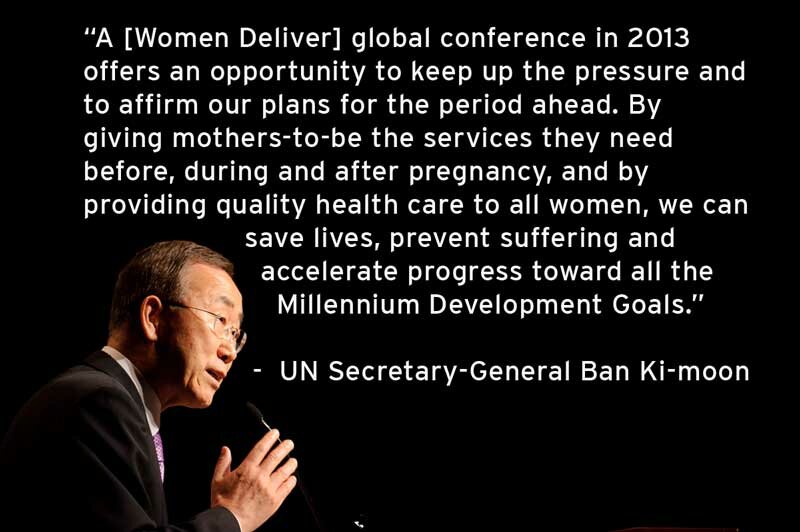
Please visit the conference site to find information on the program, media, partner events, exhibition and sponsorship opportunities, and more. You can watch the archived videos at new.livestream.com/womendeliver.
Nationally implemented surgical safety checklists in Cambodia saves lives
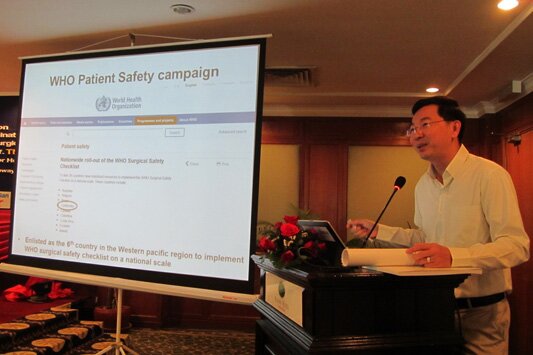
May 2013
Phnom Penh, Cambodia – Surgery is an essential part of health care. It can cure illness, reduce morbidity and save lives. Surgery also frequency leads to complications that include excess bleeding, wound infection, anesthesia problems and even death. Surgical complications are caused by many factors depending on the condition of the patient ranging from old age to health status. However for complications that are related to quality of health care, it is estimated that at least half could be avoided by routinely checking common safety issues and improving team communication.
General data for Cambodia is not available, but international studies show that complications due to surgery occur in up to 10% of cases. In high-income countries, death related to surgical complications can occur in 0.9%, whereas in low- and middle-income countries the rates soar to 11.7 % of surgery resulting in complications and 2.1% in death.
Simple ‘checklist’ may save lives – local adaptation recommended
To increase the safety of surgery, the World Health Organization (WHO) developed “Surgical Safety Checklist” in 2008. The checklist targets 10 essential objectives for safe surgery, such as surgery location, provision of safe anesthesia, the management of airway problems and hemorrhage.
The checklist is grouped into three sections, requiring the verbal check and exchange of information immediately before the induction of anesthesia, immediately before the skin incision and right after skin closure. WHO encourages local adaptation of the checklist if appropriate. It is recommended for the checklist to be read aloud and verbally confirmed within the operating team. This potential life saving process clocks-in at less than two minutes.
Effectiveness proven
The checklist has been evaluated in 8 different countries and settings and has proven its effectiveness. The use of the checklist reduced the rate of postoperative complications by more than one-third. WHO estimates that with the general use of the checklist up to half of related death case could be avoided. It is estimated that 234 million people are operated each year and more than one million of these individuals die from complications fatalities. Using the surgical checklist could result in more than 500,000 lives saved on an annually basis.
Improving quality of health care a top priority
The improvement of the quality of health care is one of the top priorities of the Ministry of Health (MoH) and is supported by the Social Health Protection Project of GIZ. Therefore the Quality Assurance Office of the MoH together with WHO Office in Cambodia identified the checklist as a ‘promising tool’ to increase the quality of surgical care.
Surgery in Cambodia, which is provided in public CPA 2, 3 and National Referral Hospitals, is on the rise. The changes in morbidity towards non-communicable diseases, such as cancer and traffic accidents are two of the reasons why this trend will probably persist.
Together with WHO, the Quality Assurance Office of the MoH developed a project plan to test the feasibility and the effects of the checklist. Financial support was received by funding from the Australian Agency for International Development, AusAID. The project included establishing an expert advisory board, a two-phased pilot, and a staff evaluation survey in participating hospitals.
Members of the advisory board included experienced surgeons as well as anesthesiologists and scientific associations, such as the Cambodian Surgical Society, donors and pilot hospitals. Pilot hospitals included the National Pediatric Hospital in Phnom Penh and the Referral Hospital in Svay Rieng.
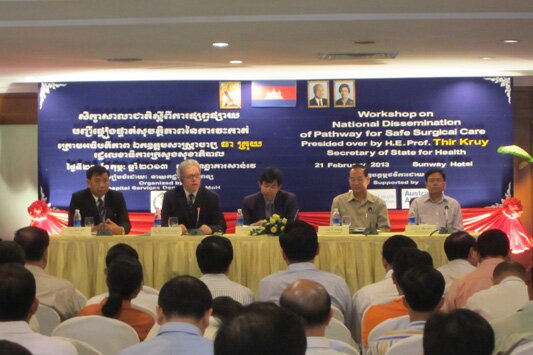
Project pilot sites show promising results
The pilot, that took place from October 2012 to January 2013, showed promising results. As surgical safety improved, surgical complications (especially wound infections) decreased. Additionally, communication among surgical staff improved and awareness for quality improvement raised.
Survey results completed by surgeons, anesthesiologist and nurses showed a very positive attitude. For example, all participants affirmed that they would like the checklist to be used in case they had to undergo surgery themselves.
Checklist adapted nationwide
Due to these convincing results, MoH quickly officially approved the checklist. The Cambodian “Safe Surgery List” is now to be used nationwide in all public hospitals where major surgery is performed. Two dissemination workshops in February 2013 marked the official nationwide roll-out. The 170 participating surgeons, anesthesiologists and nurses of the according hospitals learned about the checklist, its use and expected effects. To enable them to train the staff in their institutions, they were provided with materials for training and dissemination.
Members of the advisory board took a very active role in this process. For example, their experience and expertise was applied to adapt the original WHO checklist to survey results and the local context and language. The board also provided the workshop audience with hands-on peer experience when presenting their results and answered critical questions related to content and handling of the checklist.
The checklist will be included in the up-dated CPA Guidelines, which define the role, function and service of public hospitals. An additional measure to ensure its national routine use will be the assessment of the checklists’ use during hospital assessment surveys. The monitoring and evaluation of the routine use this year will be supported by GIZ. These steps exemplify successful project cooperation.
The pilot was conducted by the QAO with technical support from a WHO officer and the integrated CIM-expert, funded by AusAID. Monitoring of its routine use in 2013 will be supported by GIZ.
Cambodia is now the 26th country worldwide and the 6th country in the WHO pacific region, which has implemented the checklist nationwide.
For more information on the Surgical Safety Checklist contact, Dr. Dominik Dietz, MPH, Quality Management Advisor, MoH, Hospital Service Department/ Quality Assurance Office (GIZ Social Health Protection Project)
Please find the Cambodian surgical safety checklist here:
English
Khmer
Every Person Counts – See ability, not disability
“Epic Arts opens our eyes to our common humanity so that all of us can flourish.”
Archbishop Desmond Tutu
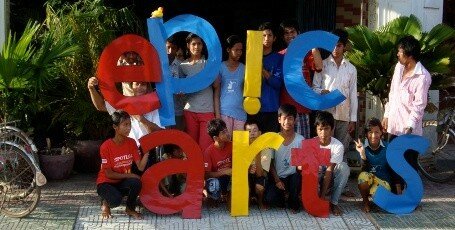
April 2013
Kampot Province, Cambodia – Artistic expression is a common human characteristic, unlocking creative potential and defying borders. Epic Arts, a disability-arts NGO (http://www.epicarts.org.uk), works towards equality by reaching out to people with physical and learning disabilities and provides deaf education and education for children with learning disabilities as well as vocational training in Kampot Province, Cambodia. Through art, Epic Arts seeks to live out the values of inclusion, understanding, justice and equality.
The organization celebrates the richness of diversity through dance and theatre performances and creative workshops. Additionally, it runs a café, selling handicrafts produced by people with impairments. The café not only offers employment to the disabled, but also acts as a social hub for people with disabilities.
Documentary showcases benefits of disability inclusion
Students of the Women’s Media Centre produced a short documentary on the work of Epic Arts with support from the DW Academy (http://blogs.dw-akademie.de/asia/2013/01/09/reporting-about-people-with-disabilities/) and the GIZ Social Health Protection Project.
On behalf of the German Federal Ministry of Economic Cooperation and Development, GIZ supports the Royal Government of Cambodia in disability inclusion in the development process. With the government’s ratification of the UN Convention on the Rights of Persons with Disabilities, disability inclusion assumes a more prominent role in development cooperation programmes, to ensure that the most vulnerable groups in society benefit from poverty reduction and development. To promote the inclusion of people with or vulnerable to disabilities the GIZ’s Social Health Protection Project deploys a mainstreaming approach in all its areas of intervention and supports selected, targeted activities in close collaboration with Handicap International Cambodia and other organisations representing people with disabilities, such as Epic Arts.

Advocating for inclusive health services
The GIZ Social Health Protection Project will further cooperate with Epic Arts in awareness rising activities and advocating for inclusive health services in the province of Kampot, one of the project’s target-areas. GIZ Social Health Protection Project seeks to involve people with disabilities and civil society as much as possible in local processes of health sector development and to complement existing efforts.
For more contact:
Dr. Heike Krumbiegel
E-mail: [email protected]
Tel: + 855 23 88 44 76
To view the short documentary about the work of Epic Arts, visit GIZ Cambodia’s YouTube Channel: http://www.youtube.com/gizcambodia
Coaching Sessions for medical professionals to improve immediate newborn care

April 2013
Kampong Thom Province, Cambodia While Cambodia’s under-five mortality rate declined from 83 deaths per 1000 live births in 2005 to 54 in 2010, the neonatal mortality rate has stagnated during the same time frame (28 deaths/1000 live births in 2005 and 27 deaths/1000 live births in 2010). Neonatal deaths now account for more than half of all under-five deaths in Cambodia. The most common causes include infection, birth asphyxia and preterm deliveries.
Simple health procedures can save newborns lives
Preventative measures such as thorough drying, skin to skin contact, properly timed cord clamping and early breastfeeding have been show to save newborn’s lives. Additionally, ventilation of non-breathing babies within one minute after birth, or within the vital “golden minute” also contributes to saving newborns at risk of post-natal death..
Immediate and thorough drying stimulates breathing and prevents hypothermia. Amongst many other benefits, sustained skin-to-skin contact initiates colonization of the newborn with maternal flora. Delaying cord clamping reduces the risk of anemia in preterm infants, and intraventricular hemorrhages. Early initiation and exclusive breastfeeding can prevent more than 95% of neonatal sepsis deaths.
Hands-on coaching sessions improve medical response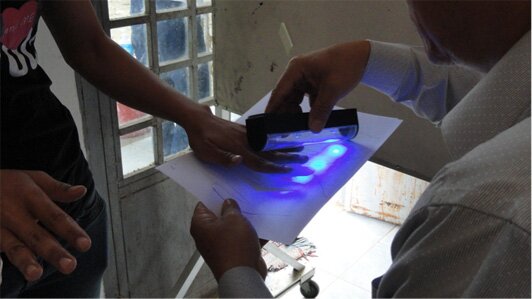
Emphasizing the need to reduce neonatal mortality, Cambodia’s Ministry of Health requested WHO’s support to strengthen immediate newborn care in Kampong Cham province. In 2011, Dr. Howard Sobel (WHO) and Ms. Chris Newsome (pediatric nurse, RACHA), developed a 2-day training and piloted it in Kampong Cham province.
Based on the success of the pilot, the Ministry of Health decided to roll-out this training nationwide. Training of trainers for the Provincial Health Department and Operational District staff from all provinces is ongoing and will be finalized in 2013. Three facilitators and 5 co-facilitators from Kampong Thom province have already been trained in December 2012.
The Immediate Newborn Care (INC) coaching sessions are very hands-on. There are no lectures and all information is provided to participants in the form of questions. Evaluations during the training include written tests (pre- and post-test), measures of hand hygiene (using Glow Germ – see image) and demonstrations of the sequential steps. At the end of the second day, each participant has to demonstrate that he or she is able to carry out all steps of immediate newborn care in the correct order and in the correct time frame.
The steps for the breathing and non-breathing baby are assessed in two separate demonstrations and role-plays. If the participant is able to repeat the correct steps during a follow up supervision visit at the health facility, he or she will be given a certificate of successful course completion.
GIZ support contributes to 4 coaching sessions – 40 midwives trained
With the technical and financial support of the GIZ Rights Based Family Planning and Maternal Health project (Muskoka), the INC facilitators in Kampong Thom conducted 4 coaching sessions at the Baray Santuk referral hospitals in February and March 2013. A total of 40 midwives successfully demonstrated mastery of the sequential steps that may save a newborn’s life. Evaluations during the training include written tests (pre- and post-test), measures of hand hygiene (using Glow Germ) and demonstrations of the sequential steps.
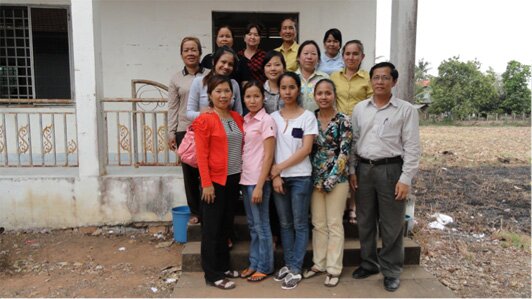 Nine coaching sessions ahead for 2013 – 130 medical professionals await training
Nine coaching sessions ahead for 2013 – 130 medical professionals await training
With 9 additional coaching sessions planned in 2013, a total of 130 midwives and doctors will become proficient in correct immediate newborn care in Kampong Thom province. Giving health care workers the skills they need to provide all newborns with the care they require in the first minutes of life is a big step towards increasing the chances of survival for these precious new lives.
For more information please contact:
Dr. Klaus Hornetz
Email: [email protected]
Tel: + 855 23 72 63 44
Author:
Karin Stubenbaum
GIZ MCH Advisor, Kampong Thom
Say Cheese: Nearly 8,000 primary school children brushing their teeth and washing their hands to prevent disease

27 March 2013
Phnom Penh, Kompot, Takeo, Kompong Thom, and Kompong Chhnang Provinces, Cambodia – Children throughout Cambodia are busy washing their hands and brushing their teeth in efforts to prevent disease and promote good hygiene.
“Thanks to the programme, primary school students are now washing their hands with soap and brushing their teeth with fluoride toothpaste at least once a day on every school day.” Mrs. Ayphalla Te, Country Project Manager, Regional Fit for School Programme said.
GIZ’s Regional Fit for School Programme with a focus on Pandemic Preparedness has been supporting the School Health Department of the Ministry of Education Youth and Sport (MoEYS) of Cambodia with the programme implementation since December 2011. Regional partner of the programme is SEAMEO INNOTECH a regional center of the South-East Asian Ministers of Education Organization. Since its inception in Cambodia, the programme has benefitted nearly 8,000 students in ten public primary schools in Phnom Penh and other four provinces: Kompot; Takeo; Kompong Thom; and Kompong Chhnang.
The programme also works with schools to ensure students receive and take a deworming tablet twice a year.
Lack of hygiene leading cause of death of children
Diseases related to lack of hygiene, such as diarrhea and respiratory infections, are still the leading cause of death for children living in Cambodia. By the time children enter school, more than half have intestinal worms and a vast majority have dental caries – virtually all untreated. Children’s health is closely related to their academic progress and performance in school. Students suffering from pain and disease are frequently absent from school, sleep less, and show an overall lower academic performance compared to healthy pupils.
GIZ’s Regional Fit for School Programmeaims to prevent infectious diseases with three simple and low-cost interventions: 1) daily hand washing with soap; 2) daily tooth brushing with fluoride toothpaste; and 3) bi-annual deworming.
The programme is designed based on the Fit for School approach pioneered in the Philippines with a great success by the Department of Education (DepED) and with support from the local NGO Fit for School Inc. as well as GIZ.
By working with the schools to construct washing facilities and ensuring availability of a functioning, running water system and providing soap and tooth brushing kits to students, the programme supports an enabling environment for students to practice daily hygiene activities together.
“The students clearly enjoy the daily hand washing and tooth brushing activities. Their breath smells better, and the homework papers they hand in are much cleaner because of their freshly washed hands,” said the teacher of a participating primary school, whom was trained by the Regional Fit for School Programme to implement the daily group hygiene activities with students.
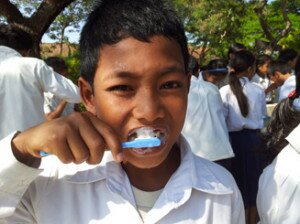
Water and soap – a simple way to prevent disease
Hand washing with soap and water is one of the most effective preventive measures against major infectious diseases. GIZ’s Regional Fit for School Programme is encouraging a change in primary school students’ hand washing behaviour by practicing this everyday. Subsequently, good habits are ingrained at a young age and the students are more likely to continue good hygiene as an adult. The students’ knowledge also sparks their interest to change their hygiene practices at home.
In the long-term, the programme aims to work with the Ministry of Education, Youth and Sport of Cambodia to institutionalize the programme approach and principles into the national school health system, so that the programme can be scaled-up to benefit many more public primary schools and students in Cambodia.
For more information on GIZ’s Regional Fit for School Programme contact:
Ayphalla Te
Country Project Manager
Email: [email protected]
Mobile phone: +855 12 906 908
German Government Delegation witnesses change in health sector
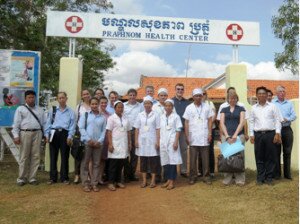
21 March 201
Kampot Province, Cambodia. – In Kampot Province change is happening in the health sector. German Technical and Financial Cooperation jointly support for example, the Pra Phnom Health Centre to improve the quality and accessibility of health care services. As the result, health services utilisation has increased to more than 80% within two years.
On 2-3 March 2013, Dr. Andreas Pfeil, BMZ, headed a delegation from the Federal Ministry of Economic Cooperation and Development Germany (BMZ), GIZ and KfW to Kampot Province to see first-hand how development in the health sector has progressed.
Midwife over sees health centre; ‘responsiveness’ a priority
After visiting the Pra Phnom Health Centre, the delegation went to Chankrey Ting, a rural health facility receiving technical support through GIZ. Unique from others, a female midwife oversees this health facility.
Responsiveness to patient requests and customer service approach impressed the delegation, which is also reflected in the high number of women choosing this health centre for obstetric care.
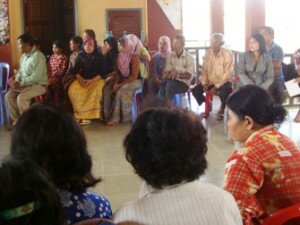 Communities acknowledges Germany’s work in client satisfaction
Communities acknowledges Germany’s work in client satisfaction
Additionally, the delegation met with commune councils and the community, including Khmer Muslims, who expressed their appreciation for Germany’s support to the promotion of client rights and the monitoring of client satisfaction.
Commune councillors requested German Development Cooperation support to address issues of people with disabilities, elderly and chronic diseases in a systematic manner. At EpicArts Café, the delegation intensively exchanged with people living with disabilities, to learn more about their daily challenges.
The delegated also visited a provincial hospital, where they were able to visit the functioning maternity department. In this department, complicated child delivery, safe abortion, new-born care and referral services offered. The delegation was also once more impressed by the preceptor-training programme, which aims to improve the quality practical training of nurse and midwifery students.
For more information, contact
Dr. Bernd Schramm
E-mail: [email protected]
Tel: + 855 23 88 44 76
Every Mother and Every Child Counts – GIZ and partners join the road to making motherhood safer for Cambodians
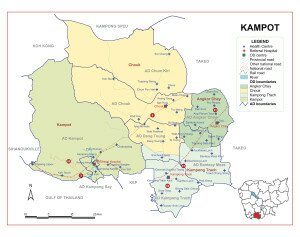
24 February 2013
Kampot Province, Cambodia – Despite the progress achieved during the last decade, Cambodia’s health indicators are still among the worst in Southeast Asia. Huge inequities exist between rural and urban population and between the wealthiest and the poorest quintiles. High risk deliveries contribute to high maternal and new-born morbidity and mortality. Reasons lie in inadequate antenatal care and unqualified attendance during emergency obstetric and new-born care, especially at the health centre level.
“The challenges in Cambodia are multi-faceted: high-risk pregnancies are not always observed, or not treated correctly; health professionals lack clinical skills; and health facilities are not well equipped to deal with emergencies,” Klaus Hornetz Project Manager explained.
In addition to these development hampers, health referral and transport systems are underdeveloped and a majority of the population, particularly in rural areas, lacks the financial means to cover transport costs even if ambulance services are available.
“The knowledge of the population to detect risk signs during pregnancy and childbirth and to seek treatment in time is low or non-existent. Our partners in the Ministry of Health and the provinces are trying to turn this fact around, and we are key supporters” Klaus Hornetz Project Manager continued.
Improving lives from day one: maternal and new-born health a high priority
Maternal and Child Health is a priority for the German Development Cooperation, GIZ, and Malteser International in Cambodia. GIZ and Malteser International initiated a partnership in October 2012 and are combining their long-standing experience in Cambodia to implement the Muskoka Project – a project that aims to improve maternal and new-born health in Kampot operational district (Kampot Province – see map for details) through focusing on obstetric care and behaviour change communication
The project takes on a two-level approach: it works to strengthen both the demand and supply side, which has proven to lead to an effective and efficient improvement of maternal and new-born health indicators. Furthermore, the project has added value and created synergy effects with other projects and programs within social health protection throughout Cambodia.
Clinical skills enhanced, quality of care in health centres on the rise
Despite recent efforts, a trained midwife shortage persists. Commonly, midwives working in rural health centres have undergone short vocational trainings, lasting a couple of months at the maximum, and thus exhibit only basic knowledge, especially with regards to emergency obstetric care.
To overcome this challenge, the project has employed highly skilled midwives, which are assigned to conduct intensive ‘on-the-job’ capacity building exercises with trainee midwives from the 10 target health centres. Once trained, the midwives should be able to contribute to higher quality obstetric care. Together the midwives focus on delivery care as well as ante- and postnatal care. The trainees are also accompanied during outreach activities to remote villages. In addition to the direct skills impact of the trainings, the aim is also to induce changes in the behaviour and attitude of medical personnel towards their clients.
Involving Communities – essential for success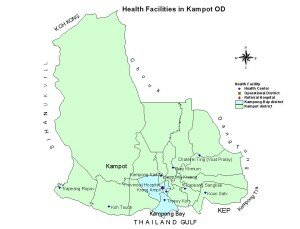
The participation of the community is essential for the success of each health project. The project plans to conduct intensive awareness sessions at the village level to promote deliveries in medical facilities; to strengthen the linkage between health centres and communities; and to increase local knowledge on how to make motherhood safer.
“We hope for this project to not only enhance capacities among the public health care providers, but to also ensure that public health services respond to the patients’ needs,” Klaus Hornetz, said.
“Our bottom line is to improve health – especially for women and children.”
Plans mapped to improve health and well-being of all Cambodians – USD 2.7 million committed for 2013
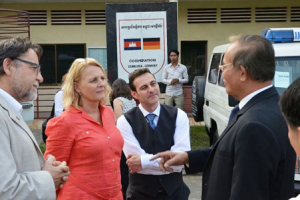
28 January 2013
Phnom Penh, Cambodia – Last month, the GIZ Social Health Protection Project and the GIZ Rights–based Family Planning and Maternal Health Project invited key partners for a consolidated planning workshop that would explore ways forward to improve health and social health protection for Cambodians and in particular for the poor and vulnerable. Dr. Sok Kanha, representative of Cambodia’s Ministry of Health opened the workshop. Over 65 participants attended as improving health care is a goal that cuts across sectors.
Additional funding provides new opportunities
The results of joint planning processes on provincial and operational district level were presented and consolidated with the national annual operational plans. It was agreed that the German Technical Cooperation will support activities in 2013 up to USD2.7 million under the joint Cambodian-German Social Health Protection Programme (SHPP).
Dr. Bernd Schramm, the SHP Project Manager noted that, ‘the significant increase in technical support reflects the appreciation of GIZ’s support, the excellent cooperation between all partners involved in the Social Health Protection Programme, as well as the German Government’s commitment to Cambodia’s Health Sector.’
Dr. Schramm mentioned that this, ‘also includes additional funding for maternal health and vulnerable groups, such as people with disabilities and the elderly.’
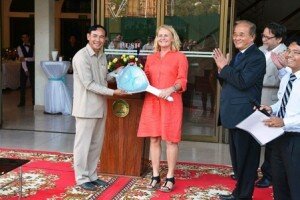
Emergency response on road to improvement with new ambulances
Directly after the workshop, GIZ invited all participants to a hand- over ceremony of four ambulances and one minibus at the National Institute of Public Health. H.E. Prof. Eng Huot, Secretary of State of the Ministry of Health, and Dr. Petra Schill, Acting Country Director of GIZ Cambodia presided over the ceremony.
As Dr. Schill mentioned in her welcome remarks, ‘this special support for ambulances and medical equipment is an important contribution to strengthen the referral system in the health sector’.
‘It ensures that patients can be quickly and safely transferred to the next and most appropriate health facility in the provinces of Kampot, Kampong Thom and Kampong Speu,’ she added.
